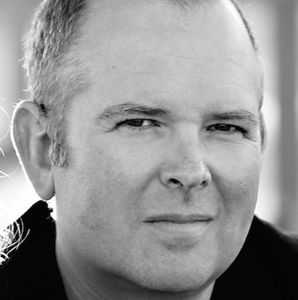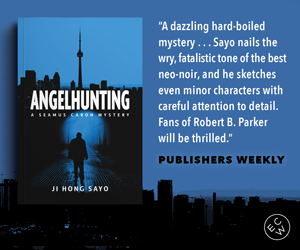On Writing, with Jamie Tennant
The Captain of Kinnoull Hill is Jamie Tennant's debut novel, but there is a lifetime of experience informing the story. After working in the music industry for years, Jamie has crafted a Nick Hornby-esque tale, which follows Dennis Duckworth, a less-than-likable music exec. "If you’ve worked in the music industry, you know someone like Dennis Duckworth," says Arkells frontman Max Kerman, noting that Dennis "somehow remains a sympathetic character".
The story follows Dennis from Chicago to rural Scotland, where he finds himself stranded and confronted with his many missteps. He is joined by the most unlikely of companions -- a 1,000-year old goblin who is also looking to change his ways.
We're pleased to welcome Jamie to the site today to talk about The Captain of Kinnoull Hill and its memorable protagonist. He tells us about appeal vs. likability, mining his music industry experience for inspiration, and how a Canadian writer ended up setting a novel in Scotland and Chicago.
Open Book:
Your main character, Dennis Duckworth, isn't particularly well liked. Did you need to find a way to like Dennis in order to write him, or is likability irrelevant in connecting to a character?
Jamie Tennant:
I think there has to be something appealing about a character, but it's not necessarily "likability." As the author I didn't always like Dennis, but I could connect with him - through our shared musical obsessions and work experiences, for example. Still, likability isn't completely irrelevant. If Dennis were 100% awful, I would have had trouble writing him in any realistic way, but he's not. Whenever Dennis acted terribly, I always knew why he acted as he did, so there was pathos that made me feel for him. Admittedly, his snarkiness entertained me a little - it was fun finding new ways for this man to be offensive without going too far - but I am not sure I would want to write a protagonist that's completely despicable, like Raymond Gunt from Douglas Coupland's Worst. Person. Ever. Though even Gunt made me crack a smile here and there.
Open Book:
The music industry attracts a lot of strong personalities like Dennis. How did you draw from your experience in the music scene when creating Dennis?
Jamie Tennant:
Dennis wasn't an amalgam of any specific individuals, but after years in the music business, he did have traits, habits and attitudes I've become familiar with. Some of these are positive - Dennis is tenacious, dedicated, truly loves music, understands music, and is willing to explore music across the boundaries of genre. Some of these, of course, are negative - he's probably a functioning alcoholic, he's a music snob, he's fake (consider all the times he lashes out and then pulls back, knowing he'll catch more flies with honey than vinegar).
Many of the events in The Captain are semi-autobiographical, culled from experiences in Toronto and Hamilton's music scenes. The same goes for some of his pivotal moments - at one point Dennis recounts borrowing some obscure and impenetrable albums from a friend, and in a way they changed his life. That happened to me as well, though perhaps somewhat less dramatically. For fellow music nerds, yes, the albums in the book are the albums I borrowed - Hoodoo Gurus, Pere Ubu, Captain Beefheart, Nomeansno.
Open Book:
What drew you to Scotland and Chicago as settings? Why were these the right places to tell this story?
Your CanLit News
Subscribe to Open Book’s newsletter to get local book events, literary content, writing tips, and more in your inbox
Jamie Tennant:
A photo of Kinnoull Hill hung in my parents' house when I was a kid, and it fascinated me because it was from my father's hometown and, hey, it looked cool. In high school I came up with a short outline for a Local Hero-ish story, but never wrote more.
Ten years ago, I began working on a mammoth novel that took place in two separate countries, Japan and Scotland. There were a lot of parallels between the two parts of the novel, and when I figured out Asahi-yama (in Nagano) would be a major setting, I knew this was my chance to finally use Kinnoull Hill. The novel ended up being too unwieldy - it was inspired by Haruki Murakami, but Lord, I'm no Haruki Murakami - so I separated the two ideas and one of them became The Captain of Kinnoull Hill.
Chicago, on the other hand, came out of nowhere. It may sound flakey to a non-writer, but as soon as I conceived of Dennis, I just "knew" he was from Chicago. I'd never been there and knew nothing about the city, so I travelled there, and still had no doubt that it was Dennis' hometown. Everyone I've met in Chicago is wonderful - so strangely enough, though I knew Dennis was from Chicago, he wound up being unlike any Chicagoan I've ever met. By the way, let me apologize to New Yorkers here, too - I don’t share Dennis' opinions on NYC!
Open Book:
Both Dennis and Eddie make big decisions to attempt to change their lives in the book. What interests you about this theme of trying to change one's fate or direction? Do you see Dennis and Eddie as more similar to or different from one another?
Jamie Tennant:
Smoking, biting your nails, eating junk food…changing habits is difficult. To me, though, those are easy compared to changing the way you react to things, think about things, and how you treat people. These are an inherent part of who we are. It's not changing a habit, it's altering your personality. Isn't it?
That's kind of what I wanted to explore. Is the way we react to something based on a habit or a personality trait we can't control? If Dennis has a habit of being sarcastic, isn't that something he can control? I actually don't know. I'm fascinated by defense mechanisms, the ways in which we convince ourselves our behavior is okay.
I'm also fascinated by self-awareness. If a person comes across as cruel, or unusual, or quirky, are they aware of it? I've met people who come across as awful, and they don't know it; I've met people who come across as awful and are fully aware of it. I suspect that for some, the more self-awareness you have, the more your defense mechanisms kick in. Dennis continually bargains with himself and lies to himself, largely because he is self-aware. He convinces himself he's the good guy, that it's the world that's against him. He does this because he knows full well that he's being horrible. Instead of changing his behavior, he lies to himself.
How do we fight our own psyche and make changes? Dennis does it because he's far from home and has hit rock bottom. Could I do it, if needed? I don't know.
Eddie is a funhouse mirror version of Dennis. Eddie has a horrific past, recognizes it, decides to make a change, then makes the change. It illustrates how powerful self-deception can be, since Dennis has smaller changes to make, but is more reluctant to make them and has more difficulty.
Open Book:
Tell us a little about the writing space in which you wrote The Captain of Kinnoull Hill.
Jamie Tennant:
My home office is a little room with an Ikea desk and a desktop computer, which I share with my family. It's not where I do my best work, though. I like open, airy spaces - cafés work well, and there's plenty of great coffee shops in Hamilton in which I've written. Most of the editing on The Captain happened on the second floor of the McMaster University Student Centre, in the quiet study area, where I'd work for 20 - 30 minutes a day - miles from ideal, but at that point, it was my only option. I work terribly in the evenings.
Open Book:
What will you be working on next?
Jamie Tennant:
There are a few possibilities. I have a novel I wrote in my '20s which I want to revisit. I have the Japanese half of the aforementioned mammoth novel. Mostly, though, I've working on a completely new novel. It's the story of a young Canadian musician who discovers her father's true identity - a legendary-yet-obscure musician who disappeared in 1974. It's ostensibly about the mystery of his disappearance, but it's largely about his daughter, her search for the truth, and the experiences of women in modern music.
Jamie Tennant is a writer and radio program director based in Hamilton, ON. A long-time music enthusiast, James has covered music and pop culture both locally and nationally. He is the Program Director at 93.3 CFMU at McMaster University, hosting two shows. In 2014, he was co-founder of the Hamilton Independent Media Awards. When he is not helping set up the JUNOs, being on the Grand Jury for the Polaris Prize, or blogging for the Fujirock festival in Japan, Tennant continues to write for several magazines and blogs; his 2009 article on rock band Simply Saucer was nominated for a National Magazine Award. He currently lives in Hamilton with his wife and son. The Captain of Kinnoull Hill is his debut novel.




